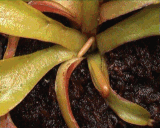This is also a solution for you if you love the look of plants indoors but don’t have the time or a green thumb to take care of them. A terrarium is a self-contained plant habitat. Once you have set-up the terrarium and closed the lid (on the jar or other container you have chosen) the plants inside create their own eco-system – all you have to do is enjoy it.
The choices for terrarium containers are only limited by your imagination. Traditionally a smaller aquarium is used with a lid but a glass jar or other container will work nicely too. Plastic will work as well, just make sure that it is a clear plastic or you won’t be able to admire your handiwork once it is completed. Whatever size or material you choose for your terrarium the most important factor is that it does not leak. You need the water and moisture to stay inside for it to work and you don’t want a mess inside your house.
 Image via WikipediaThe plants that you choose should all thrive in similar conditions and grow well in a humid environment. Popular plants to put into a terrarium are carnivorous (Venus Fly Trap (kids will love these!), sundew, or pitch plant) or rain forest plants (chamaedorea palms, small ferns or fittonia).
Image via WikipediaThe plants that you choose should all thrive in similar conditions and grow well in a humid environment. Popular plants to put into a terrarium are carnivorous (Venus Fly Trap (kids will love these!), sundew, or pitch plant) or rain forest plants (chamaedorea palms, small ferns or fittonia). Terrariums are a low-maintenance indoor garden. They need indirect sunlight (not too bright) and very little watering is needed after the initial water is added. The heat from inside the terrarium evaporates the water and then it condenses on the lid falling back down to the plants. This process will continue keeping your plants alive. If there is too much water present, you may need to vent the terrarium (with a vented lid or opening the top a small amount) just be sure to keep an eye on the soil’s moisture level (not too wet or dry).

No comments:
Post a Comment